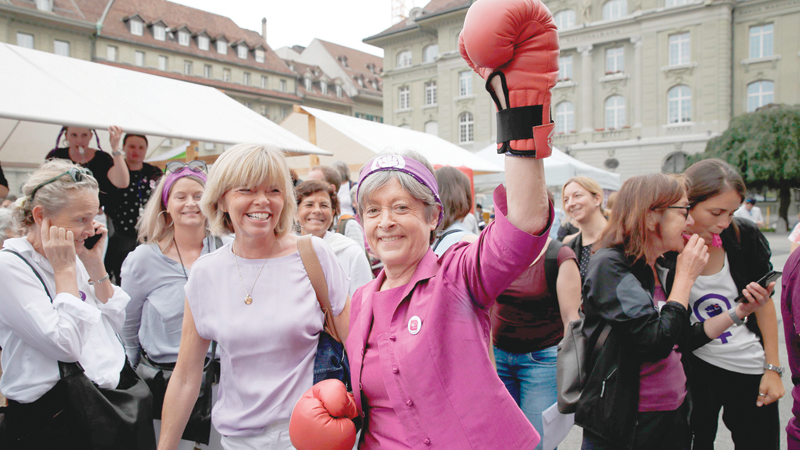

Geneva: Purple-clad protesters blowing whistles, banging pots and pans and brandishing feminist slogans filled the streets of Swiss towns and cities on Friday, as women across the country went on strike for equal pay.
Women poured into the streets to vent their frustration with persistent gender discrimination and wage gaps in the wealthy Alpine nation.
The strike comes nearly three decades after women held the country’s first nationwide strike for equal pay.
Thousands of women dressed in purple — the colour chosen to show solidarity with the cause — filled the square in front of the government and parliament buildings in Bern on Friday morning.
Swiss Defence Minister Viola Amherd, flanked by a large group of women MPs draped in purple, including one wearing boxing gloves, joined the demonstrators briefly as Parliament took a 15-minute break to mark the occasion.
“It’s wonderful! We are here to make noise, because if we’re not seen, we don’t exist,” Socialist MP Ada Marra told the RTS broadcaster in Bern.
Pram marches, whistle concerts and giant picnics were planned around the country, with the day’s events set to culminate in giant demonstrations in several cities.
In Lausanne, the events kicked off overnight, with women ringing the bells of the cathedral, which was lit up in purple, and lighting a “bonfire of joy”.
By morning, some 500 people gathered for a massive breakfast celebration, blocking traffic on one of the town’s main bridges.
In Geneva, protesters replaced street signs bearing men’s names with women’s ones. While 548 streets in Geneva Canton are named after men, only 41 have female names, according to the ATS news agency.
The events come exactly 28 years after half a million women walked out of their workplaces or homes across Switzerland to protest persistent inequalities, on June 14, 1991. That was 10 years after equality between the sexes was enshrined in the Swiss constitution.
But the organisers of Friday’s events say things have barely improved since then, insisting women need to demand “more time, more money, more respect”.
Women in Switzerland on average still earn 20 per cent less than men.
And for men and women with equal qualifications, the wage gap remains nearly eight per cent, according to the national statistics office.
“Wage equality has not been achieved. That is a good reason to go on strike,” Ruth Dreyfuss, who in 1998 became Switzerland’s first female president, told broadcaster RTS on Friday.
Riding the wave of the global #MeToo movement, a new generation of women is attacking the lingering issues of discrimination, harassment, sexual abuse and wage inequality with renewed vigour.
Organisers have called upon women to snub their jobs and housework for the entire day to help raise awareness of the vital contribution women make across society.
For those women unable to take a full day, the organisers urge them to at least pack their things and leave by 3:24 pm.
“After that, women work for free,” said Anne Fritz, the main organiser of the strike and a representative of USS, an umbrella organisation that groups 16 Swiss unions.
Back in 1991, one in seven women in the country took part in the strike.
That was a remarkable turnout given that work stoppages have been extremely rare in Switzerland since employers and unions signed the “Peace at Work” convention in 1937. It states that differences should be worked out through negotiation rather than strikes.
Back then, many women were blocked from participating in the strike, and organisers fear a repeat Friday, with the country’s main employers’ organisation flatly opposed to the action.
Thursday’s strike was born out of frustration at a bid to change the law to impose more oversight over salary distribution, after a watered-down version passed through the Swiss parliament last year.
Gaining recognition of women’s rights has been a drawn-out process in Switzerland, which was one of the last countries in Europe to grant women the right to vote, in 1971.
Over the past three decades, womens’ rights advocates in Switzerland have made some gains. Abortion was legalised in 2002, and 2005 saw the introduction of 14 weeks of paid maternity leave.
But Switzerland still offers no paternity leave, and limited access to expensive day-care is seen as a major hindrance to women’s integration into the labour market.
Christa Binswanger, a gender studies professor at St Gallen University, said she was optimistic that Friday’s strike would make a difference.
“It has already shown an impact during the last weeks,” prompting wide media coverage of gender issues, she said.
“The strike has mobilised a sense of solidarity.” — AFP
Oman Observer is now on the WhatsApp channel. Click here



